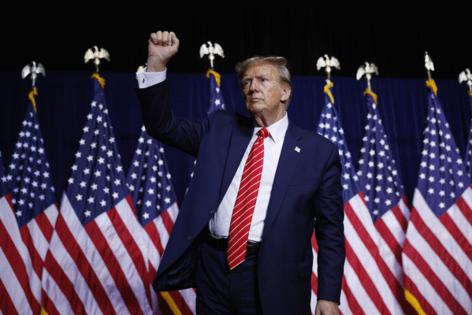Nicole Russell: The real problem with Christian nationalism isn't politics, it's power -- and Trump
Published in Op Eds
Most evangelical Christians even mildly involved or interested in politics will tell others to vote for Donald Trump. They’ll say that he is the best candidate because of his policies and, paraphrasing the Bible, say that God has appointed him to represent America “for such a time as this.”
But mostly, they’ll convince themselves that voting for Trump is the best way to win over the culture war, get prayer back in schools, and restore the United States to its theocratic roots. This is prominent in evangelical strains across the U.S., but especially in the South, in the Southern Baptist Convention — save for former top official Russell Moore— and, of course, Texas.
Christians are told to be a “light” in a godless world, “salt” in a world that’s rejected God and thus lives without purpose or hope. Evangelicals, particularly, lean on the call of Jesus to his own disciples to bring good news to all and tell them of the hope faith in Jesus Christ’s life, death and resurrection offers, to accept the gift of salvation, so they can spend eternity in heaven with Him and other believers. This is true and good.
It’s often the sincere belief among evangelicals that we are all called to different fields or disciplines in this world — some tell others about Jesus in third-world countries, others foster children, while still others argue cases in front of the Supreme Court, the decisions of which they hope will help return the U.S, to a more conservative, God-honoring state. God has gifted every human being with different strengths and proclivities. Christian Nationalists take this a big step further and, as Christianity Today defines it, “ believe American identity is inextricable from Christianity” and it is their duty to restore this via policy and politicians.
Religious influence has always existed in American politics. Today’s modern evangelical convergence into politics started with Ronald Reagan and heightened with George W. Bush. His candidacy galvanized millions of social conservatives, Christians who voted on just a handful or sometimes even one topic: abortion. Evangelicals found hope in a born-again Texan’s leadership, which seemed faith-based yet tangible, strong yet compassionate.
But still the country has continued to shift away from any kind of faith-based values. While some continued to pour their lives into mission work, charitable organizations, or churches, more and more looked to politics to be their earthly religion, and Republican leaders to be their god.
Enter 2016 Trump. After eight years of Barack Obama, Trump seemed to hold the leader to change America’s course. Even though almost nothing about his personal life demonstrated that he held true faith in God, or anything, but himself. Even though he didn’t seem to even try to live in a way that demonstrated upward values, Trump was charismatic, promised conservative victories and courted Christians who were easily manipulated. 2024 Trump is doing the same thing with the same results.
At the end of 2023, according to the Pew Research Center, 55% of white evangelical Republican voters said they would vote for Trump. Now that he has clinched the Republican nomination, that number has probably risen. At the grassroots level, this means that in churches across Texas, pastors will endorse Trump from the pulpit, and other Republican candidates down-ballot, violating tax law. Organizations such NEXUS Mountain Network, a Christian-based social network, will support Texas-based Mercy Culture, Candace Owens, and Dr. Lance Wallnau, promoting the idea that evangelicals have a right and a duty to be politically active and advocate for Christian nationalism.
The problem with all this isn’t that evangelicals are involved in politics — they should be. Heck, everyone, regardless of religion or creed, should show some interest in civics. It isn’t that evangelicals encourage their friends to vote or are pro-life, or even that they think America would lose its identity and even freedom if we fail to preserve our cultural inheritance.
The biggest problem, mostly, is that evangelical Christians have decided political power is the way to usher America back to its roots and that Donald Trump is not just the salve but the key, the leader through which to do this.
Trump’s candidacy has recognized and glorified Christian nationalism: Now, it’s more vocal, determined, and — ironically — more hypocritical than ever. Trump rarely espouses Christian values in his personal life, though he did champion religious liberty and claimed to be pro-life while in office. He lured populist voters and attracted fringe extremists — the kind of people who fly from Texas to the Capitol to participate in an insurrection, get arrested, and claim they were just restoring Christian values to their beloved democratic republic.
God did not call Christians to follow Donald Trump or the American political system or even to preserve America’s heritage above all. Christian nationalism a la Donald Trump makes Trump God and power the goal, rather than faith or even embracing the values Christ spoke of: loving him above all and our neighbors as we love ourselves. This isn’t right.
___
©2024 Fort Worth Star-Telegram. Visit at star-telegram.com Distributed by Tribune Content Agency, LLC.







Comments